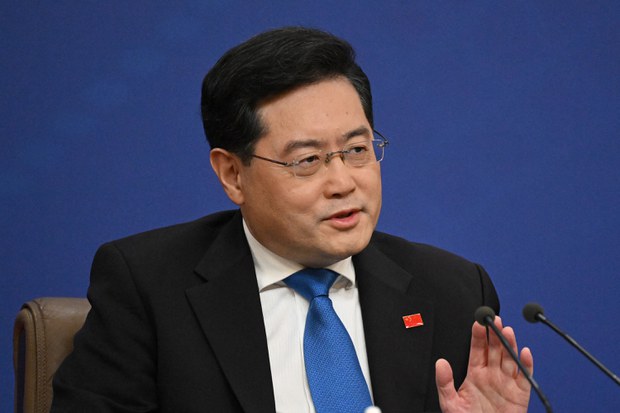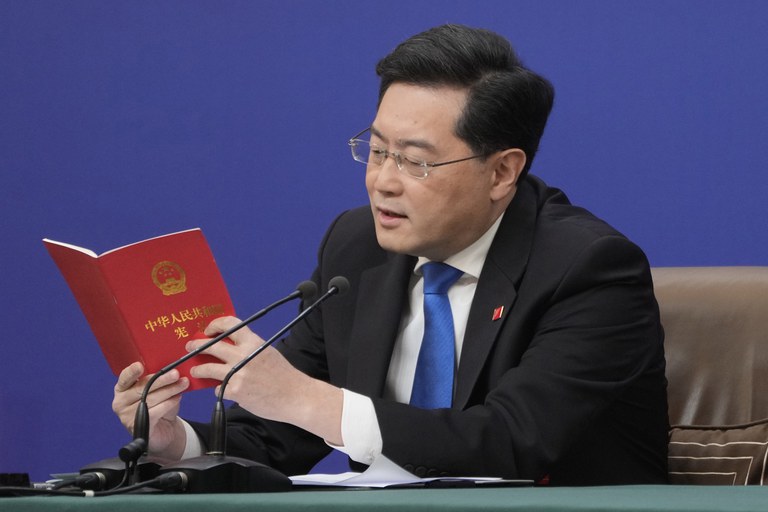China FM says conflict unavoidable if US pursues ‘wrong path’ in relations
Share

China’s Foreign Minister Qin Gang speaks during a press conference at the Media Center of the National People’s Congress in Beijing on Tuesday, March 7, 2023.
The United States and China are destined for conflict if Washington refuses to “hit the brakes” as it “speed[s] down the wrong path” of engagement with Beijing, China’s new Foreign Minister Qin Gang said Tuesday during his first media appearance in the role.
Qin spoke on the sidelines of the “two sessions” annual meeting of China’s National People’s Congress, which kicked off on Sunday and is expected to showcase a major political reshuffle following President Xi Jinping’s securing of an unprecedented third term as leader.
Qin dismissed calls by the Biden administration for “guardrails” to prevent increasingly sour U.S.-China relations from deteriorating into full-blown hostility.
“If the U.S. does not hit the brakes but continues to speed down the wrong path, no amount of guardrail can prevent derailing, and there will surely be conflict and confrontation,” said Qin, the former ambassador to the United States who became China’s top envoy in December.
Qin also called the Biden administration’s plans to outcompete China without conflict code for “all-out containment and suppression” and said it was a “zero-sum game.”
Working with Moscow
Rather than discussing ways to improve ties between the world’s two largest economies, Qin highlighted cooperation between Beijing and Moscow, which he said “set an example for global foreign relations.”
“With China and Russia working together, the world will have a driving force,” he said. “The more unstable the world becomes, the more imperative it is for China and Russia to steadily advance their relations.”
Western nations have been closely watching the relationship between China and Russia following the latter’s invasion of Ukraine, which Beijing has supported. Some observers say China is gauging the West’s reaction to the conflict to determine whether it will invade Taiwan, which has self-governed for decades, but which Beijing claims is a runaway province.
Qin laid the blame for increasing tensions over Taiwan with the United States, which is obligated to provide Taipei with defense capabilities under the Taiwan Relations Act.
“The Taiwan question is the bedrock of the political foundations of U.S.-China relations, and the first red line that must not be crossed in U.S.-China relations,” he said, before reading a passage from a copy of China’s constitution which claims Taiwan as a “sacred” part of China.
Qin also made comparisons between Taiwan and Ukraine, where he said the conflict has been guided by “an invisible hand … using the Ukraine crisis to serve certain geopolitical agendas.” He accused the U.S. of hypocrisy for defending Ukraine’s sovereignty but refusing to acknowledge China’s claim over Taiwan.


Qin’s hawkish comments followed similar ones from Xi Jinping in an address he made to political delegates on Monday, when he accused the U.S. of working to “suppress” Chinese ambitions.
“Western countries led by the United States have implemented all-round containment, encirclement and suppression of China, which has brought unprecedented severe challenges to our country’s development,” Xi said.
‘Upholding the rules-based order’
At a State Department briefing in Washington on Tuesday, spokesman Ned Price reiterated that the U.S. has no intention of entering into a conflict with China.
“I couldn’t speak to the motivation for some of the statements we’ve heard from senior PRC leaders over the course of the past several days, but what I can tell you – and this is a message intended for the American people [and] the Chinese people around the world – that United States does not seek conflict,” he said.
“The United States seeks a relationship with the PRC that has a floor, that has guardrails, and that ultimately is a relationship that has measures in place to prevent competition from veering into conflict.”
Price told reporters that the United States views competition as “healthy” and “something that we seek out on a constructive basis.”
“This is not about containing China. This is not about suppressing China. This is not about holding China back,” he said. “This is about upholding the rules-based order. The rules-based order that countries like China have signed on to – that they signed on to in the earliest days of the U.N. system.”
Price also said that the United States wants to maintain communication with Beijing to prevent a conflict, noting that Secretary of State Antony Blinken recently met with Director of the Office of the Central Foreign Affairs Commission Wang Yi in Munich.
He pointed out that China’s People’s Liberation Army cut contact with the U.S. Department of Defense earlier this year after the U.S. shot down what it said was a Chinese spy balloon flying in American airspace, and suggested reopening the communication channel to help avoid a confrontation.
Economic downturn
Despite the bravado from Qin, three years of zero-Covid policies in China have taken their toll on the country’s economy and Beijing needs to maintain trade relations with the West.
At the opening of the National People’s Congress on Sunday, party officials set a target for 2023 GDP growth at “around 5%” following an expansion of only 3% in 2022 – the country’s slowest rate of growth in nearly 50 years.
Tan Yaonan, the chairman of the Cross-Strait Policy Association in Taiwan, told RFA that Beijing is concentrating on alleviating China’s economic challenges, while “hoping to maintain a competitive relationship” with the U.S.
“[Beijing is] trying to ‘control’ differences … so as not to deliberately attract greater conflict, or allow the Western world to join forces against China,” he said.
In recent months, Beijing appeared to have toned down what has been termed its standoffish “wolf warrior” brand of diplomacy amid a worsening economic outlook. The appointment of Qin, who is seen as less brash than his colleagues, was viewed as an extension of that toning down.
However, Qin on Tuesday warned that “if faced with jackals and wolves, China has no choice but to face them head on,” suggesting that China may be returning to its earlier aggressive style of foreign relations.
With additional material from Jerry Zhao. Edited by Malcolm Foster.







